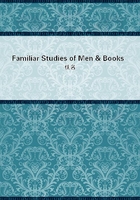
第85章
I. - THE CONTROVERSY ABOUT FEMALE RULE.
WHEN first the idea became widely spread among men that the Word of God, instead of being truly the foundation of all existing institutions, was rather a stone which the builders had rejected, it was but natural that the consequent havoc among received opinions should be accompanied by the generation of many new and lively hopes for the future.
Somewhat as in the early days of the French Revolution, men must have looked for an immediate and universal improvement in their condition. Christianity, up to that time, had been somewhat of a failure politically. The reason was now obvious, the capital flaw was detected, the sickness of the body politic traced at last to its efficient cause. It was only necessary to put the Bible thoroughly into practice, to set themselves strenuously to realise in life the Holy Commonwealth, and all abuses and iniquities would surely pass away. Thus, in a pageant played at Geneva in the year 1523, the world was represented as a sick man at the end of his wits for help, to whom his doctor recommends Lutheran specifics. (1) The Reformers themselves had set their affections in a different world, and professed to look for the finished result of their endeavours on the other side of death. They took no interest in politics as such; they even condemned political action as Antichristian: notably, Luther in the case of the Peasants' War. And yet, as the purely religious question was inseparably complicated with political difficulties, and they had to make opposition, from day to day, against principalities and powers, they were led, one after another, and again and again, to leave the sphere which was more strictly their own, and meddle, for good and evil, with the affairs of State. Not much was to be expected from interference in such a spirit. Whenever a minister found himself galled or hindered, he would be inclined to suppose some contravention of the Bible. Whenever Christian liberty was restrained (and Christian liberty for each individual would be about coextensive with what he wished to do), it was obvious that the State was Antichristian. The great thing, and the one thing, was to push the Gospel and the Reformers' own interpretation of it. Whatever helped was good; whatever hindered was evil; and if this simple classification proved inapplicable over the whole field, it was no business of his to stop and reconcile incongruities. He had more pressing concerns on hand; he had to save souls; he had to be about his Father's business. This short-sighted view resulted in a doctrine that was actually Jesuitical in application. They had no serious ideas upon politics, and they were ready, nay, they seemed almost bound, to adopt and support whichever ensured for the moment the greatest benefit to the souls of their fellow-men. They were dishonest in all sincerity.
Thus Labitte, in the introduction to a book (2) in which he exposes the hypocritical democracy of the Catholics under the League, steps aside for a moment to stigmatise the hypocritical democracy of the Protestants. And nowhere was this expediency in political questions more apparent than about the question of female sovereignty. So much was this the case that one James Thomasius, of Leipsic, wrote a little paper (3) about the religious partialities of those who took part in the controversy, in which some of these learned disputants cut a very sorry figure.
(1) Gaberel's EGLIST DE GENEVE, i. 88.
(2) LA DEMOCRATIE CHEZ LES PREDICATEURS DE LA LIGUE.
(3) HISTORIA AFFECTUUM SE IMMISCENTIUM CONTROVERSIAE DE GYNAECOCRATIA. It is in his collected prefaces, Leipsic, 1683.
Now Knox has been from the first a man well hated; and it is somewhat characteristic of his luck that he figures here in the very forefront of the list of partial scribes who trimmed their doctrine with the wind in all good conscience, and were political weathercocks out of conviction. Not only has Thomasius mentioned him, but Bayle has taken the hint from Thomasius, and dedicated a long note to the matter at the end of his article on the Scotch Reformer. This is a little less than fair. If any one among the evangelists of that period showed more serious political sense than another, it was assuredly Knox; and even in this very matter of female rule, although I do not suppose any one nowadays will feel inclined to endorse his sentiments, I confess I can make great allowance for his conduct. The controversy, besides, has an interest of its own, in view of later controversies.
John Knox, from 1556 to 1559, was resident in Geneva, as minister, jointly with Goodman, of a little church of English refugees. He and his congregation were banished from England by one woman, Mary Tudor, and proscribed in Scotland by another, the Regent Mary of Guise. The coincidence was tempting: here were many abuses centring about one abuse; here was Christ's Gospel persecuted in the two kingdoms by one anomalous power. He had not far to go to find the idea that female government was anomalous. It was an age, indeed, in which women, capable and incapable, played a conspicuous part upon the stage of European history; and yet their rule, whatever may have been the opinion of here and there a wise man or enthusiast, was regarded as an anomaly by the great bulk of their contemporaries. It was defended as an anomaly.
It, and all that accompanied and sanctioned it, was set aside as a single exception; and no one thought of reasoning down from queens and extending their privileges to ordinary women.
Great ladies, as we know, had the privilege of entering into monasteries and cloisters, otherwise forbidden to their sex.